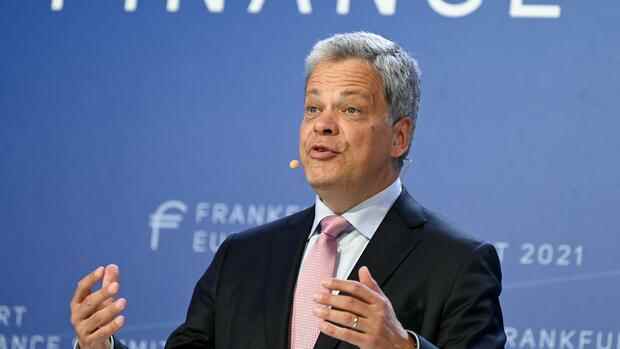Frankfurt Commerzbank boss Manfred Knof is preparing for a strong headwind because of the consequences of the Ukraine war. “The energy supply in Germany is at risk, supply chains are breaking down, we have high inflation,” explained Knof in his previously published speech at the virtual general meeting on May 11. Commerzbank, which handles around a third of German foreign trade, has to adapt to this.
“That’s why we work closely with our corporate customers on the currently difficult issues – such as how to deal with the rising commodity prices and the bottlenecks in the supply chains,” said Knof. “But we mustn’t delude ourselves either: The number of insolvencies in our markets will probably increase and with it the risk provisions of the banks.”
In the first quarter, Germany’s second largest private bank more than tripled its loan loss provisions to EUR 464 million. This was mainly due to a general risk provision of around half a billion euros in connection with the war in Ukraine.
The institute is represented in Russia by its subsidiary Commerzbank Eurasija. The money house reduced its business in Russia after the outbreak of war to 1.3 billion euros in mid-March, but did not withdraw completely.
Top jobs of the day
Find the best jobs now and
be notified by email.
“We have stopped our new business in Russia,” emphasized Knof. “We continue to carry out existing business with German and international customers.” The institute observes all sanctions as well as legal and regulatory requirements.
How business will continue in Russia will depend, among other things, on Russia’s behavior and further sanctions. “We continue to monitor developments in Russia and Ukraine closely,” explained Knof. “We are continuously adapting our business strategy and risk assessment to the current situation.”
Chairman of the Supervisory Board: 2022 will not be an easy year
Knof has been at the head of Commerzbank since the beginning of last year and has prescribed a strict austerity program for the institute. By 2024, the institute wants to cut a total of 10,000 full-time positions and close 340 branches – and is making good progress so far. More than 6,000 employees have already left the bank or signed an agreement to leave. In addition, around 240 branches were closed.
The first year of transformation was an important step, explained the chairman of the supervisory board, Helmut Gottschalk, in his speech, which was also published in advance. “Now it is important that we take the next steps just as consistently. The year 2022 will certainly not be easy – especially in view of the current political developments.”
Among other things, Gottschalk and his colleagues on the supervisory board have revised the management board remuneration system and are putting it to the vote at the shareholders’ meeting. In future, management should only receive a bonus for the operating result if at least 60 percent of the target value has been achieved. So far there is no such threshold.
Reduce tenure of board members
In addition, Commerzbank wants to shorten the term of office for supervisory board members from five to four years. “But the general meeting should be able to go even further and be given the right to determine an even shorter term of office when electing the shareholder representatives,” explained Gottschalk. In this way, the term of office of the shareholder representatives could be staggered and the flexibility on the supervisory board increased, because then all shareholder representatives would no longer have to be re-elected at a single general meeting.
The influential proxy advisors ISS and Glas Lewis support the planned reforms in the supervisory board. Glass Lewis, on the other hand, rejects the new board remuneration system because the proxy advisor considers it too backward-looking. ISS does not want to approve the board remuneration report – among other things because of a special payment for CEO Knof.
The Commerzbank leadership also has to prepare for critical questions at the shareholders’ meeting on other issues – for example the stopped outsourcing of securities processing to HSBC. The failed large-scale project cost the Frankfurt money house more than 200 million euros.
Criticism of Wirecard loan and failed major project
In a counter-motion, former employee and Commerzbank shareholder Bernd Heckmann demands that the Board of Management and the Supervisory Board not be exonerated because of the failed outsourcing and a failed loan to the scandalous Wirecard group.
Regarding the outsourcing of securities processing, Heckmann writes that all board members were already aware at the beginning of 2020 that the project had gotten out of hand. “They had an obligation to take suitable measures to ensure that the obvious undesirable development, which ultimately even developed into a disaster, is stopped.” Significant damage was done.”
Because of the loan to Wirecard, the institute had to write off 187 million euros two years ago. Heckmann is of the opinion that Commerzbank Wirecard did not check Wirecard carefully enough when lending and also violated internal rules.
The institute rejected the allegations at the 2021 Annual General Meeting. However, the supervisory board also had the Frankfurt lawyer and notary Kersten von Schenck check whether members of the board of directors violated their obligations when granting credit to Wirecard and should therefore be sued for damages – and then denied this.
“The supervisory board incorrectly agreed with the assessment of the lawyer without its own examination,” writes Heckmann in his counter-motion. He does not want to put up with it and will raise the issue again at the shareholders’ meeting next week.
More: The uncomfortable Mr. Gottschalk: the head of the supervisory board confronts Commerzbank with a new world
